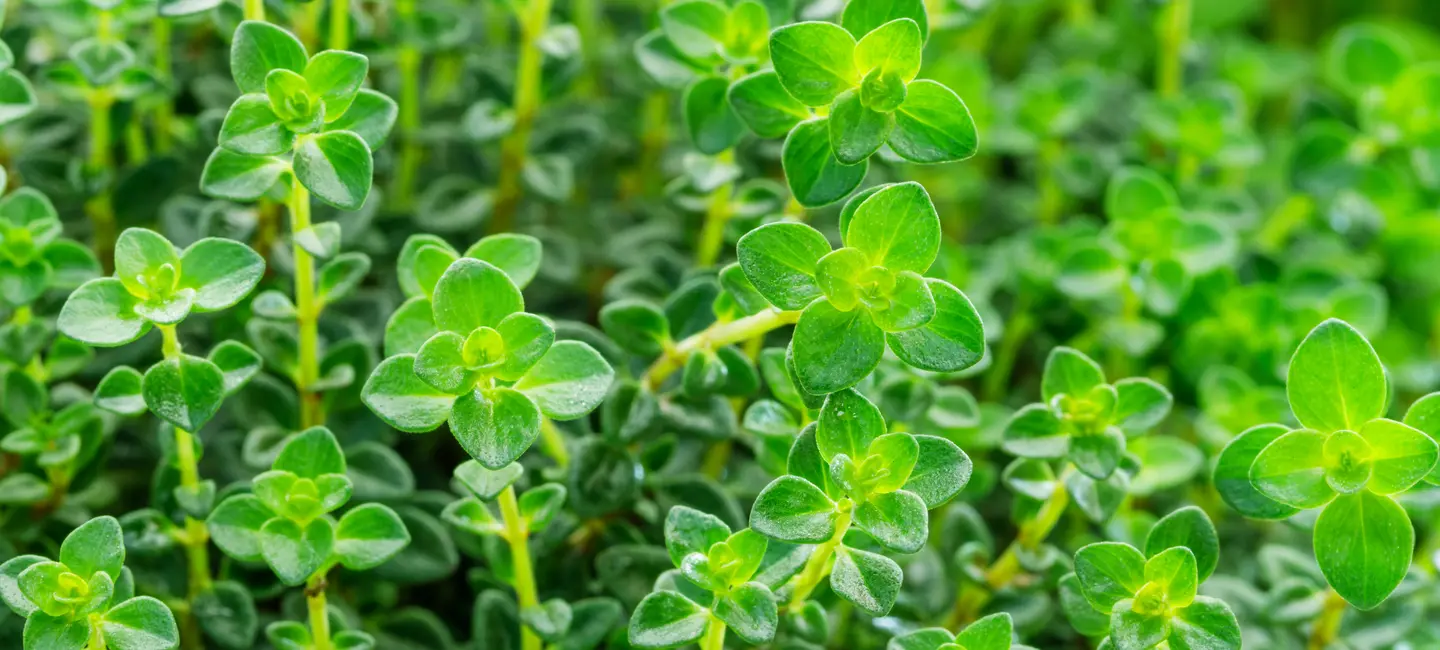
Thyme (Thymus vulgaris) is an herb with a distinct smell. The flowers, leaves, and oil are commonly used to flavor foods and are also used as medicine.
Thyme contains chemicals that might help bacterial and fungal infections. It also might help relieve coughing and have antioxidant effects.
People commonly use thyme for cough, patchy hair loss (alopecia areata), dementia, and many other conditions, but there is no good scientific evidence to support these uses.
Don't confuse thyme with wild thyme. These are two different plants.
Is It Effective?
There is interest in using thyme for a number of purposes, but there isn't enough reliable information to say whether it might be helpful.
Is it Safe?
When taken by mouth: Thyme is commonly consumed in foods. Thyme is possibly safe when used as medicine, short-term. It might cause allergic reactions, dizziness, and stomach upset in some people. There isn't enough reliable information to know if thyme oil is safe to use as medicine or what the side effects might be.
When applied to the skin: Thyme oil is possibly safe when used short-term. Some people might experience skin irritation.
When inhaled: There isn't enough reliable information to know if thyme oil is safe or what the side effects might be.
Special Precautions & Warnings:
Pregnancy and breast-feeding: Thyme is commonly consumed in foods. There isn't enough reliable information to know if thyme is safe to use in larger amounts while pregnant or breast-feeding. Stay on the safe side and stick to food amounts.
Children: Thyme is commonly consumed in foods. Thyme is possibly safe when taken as medicine for short periods of time. There isn't enough reliable information to know if thyme oil is safe to use as medicine or what the side effects might be.
Allergy to oregano and similar plants: People who are allergic to oregano or other Lamiaceae species might also be allergic to thyme.
Hormone-sensitive conditions such as breast cancer, uterine cancer, ovarian cancer, endometriosis, or uterine fibroids: Thyme might act like estrogen in the body. If you have any condition that might be made worse by exposure to estrogen, don't use thyme.
Surgery: Thyme might slow blood clotting. This might increase the risk of extra bleeding during and after surgery. Stop using thyme at least 2 weeks before a scheduled surgery.
Drying medications (Anticholinergic drugs)
Interaction Rating=Moderate Be cautious with this combination.
Thyme can increase a chemical in the body called acetylcholine. Acetylcholine plays a big part in many important body functions. Some medications, called anticholinergic drugs, block the effects of acetylcholine in the body. Taking thyme might decrease the effects of anticholinergic drugs.
Estrogens
Interaction Rating=Moderate Be cautious with this combination.
Thyme might act like estrogen in the body. Taking thyme along with estrogen might decrease the effects of estrogen.
Medications that slow blood clotting (Anticoagulant / Antiplatelet drugs)
Interaction Rating=Moderate Be cautious with this combination.
Thyme might slow blood clotting. Taking thyme along with medications that also slow blood clotting might increase the risk of bruising and bleeding.
Various medications used for glaucoma, Alzheimer disease, and other conditions (Cholinergic drugs)
Interaction Rating=Moderate Be cautious with this combination.
Thyme can increase a chemical in the body called acetylcholine. Some medications that are used for glaucoma, Alzheimer disease, and other conditions, also increase acetylcholine levels. Taking thyme with these medications might increase the chance of side effects.
Herbs and supplements that might slow blood clotting: Thyme might slow blood clotting and increase the risk of bleeding. Taking it with other supplements with similar effects might increase the risk of bleeding in some people. Examples of supplements with this effect include garlic, ginger, ginkgo, nattokinase, and Panax ginseng.
There are no known interactions with foods.
Thyme is commonly used to flavor foods. It is also used in soaps, cosmetics, and toothpastes.
In supplements, there isn't enough reliable information to know what an appropriate dose of thyme might be. Keep in mind that natural products are not always necessarily safe and dosages can be important. Be sure to follow relevant directions on product labels and consult a healthcare professional before using.
Common Thyme, Farigoule, Farigoulette, French Thyme, Frigoule, Garden Thyme, Huile Essentielle de Thym, Huile de Thym, Huile de Thym Blanc, Huile de Thym Rouge, Mignotise des Genevois, Oil of Thyme, Pote, Red Thyme Oil, Rubbed Thyme, Serpolet, Spanish Thyme, Thym, Thym Citron, Thym Commun, Thym des Jardins, Thym Maraîcher, Thym Vrai, Thym Vulgaire, Thyme Aetheroleum, Thyme Essential Oil, Thyme Oil, Thymi herba, Thymus vulgaris, Thymus zygis, Tomillo, Van Ajwayan, Vanya Yavani, White Thyme Oil.
Information on this website is for informational use only and is not intended to replace professional medical advice, diagnosis, or treatment. While evidence-based, it is not guaranteed to be error-free and is not intended to meet any particular user’s needs or requirements or to cover all possible uses, safety concerns, interactions, outcomes, or adverse effects. Always check with your doctor or other medical professional before making healthcare decisions (including taking any medication) and do not delay or disregard seeking medical advice or treatment based on any information displayed on this website.
© TRC Healthcare 2024. All rights reserved. Use and/or distribution is permitted only pursuant to a valid license or other permission from TRC Healthcare.
